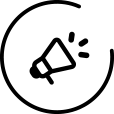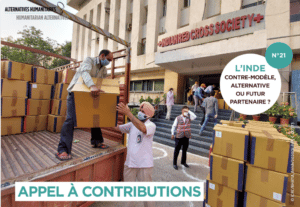N°21 – November 2022 : « India: counter-model, alternative or future partner? » (provisional title)
A Focus co-directed by Pierre Micheletti, Chairman of Action Against Hunger – France, doctor, essayist and writer with Boris Martin, editor-in-chief of Humanitarian Alternatives
Together with the Red Cross and Red Crescent movement and specialised United Nations (UN) organisations, non-governmental organisations (NGOs) from international civil society are the third largest family of international actors. Still overwhelmingly Western, they bring together and organise citizens who express the shared ambition to change public policies in their countries of origin. But they also intend to act at a distance from these countries in order to deploy solidarity actions. They claim to intervene in the name of a common humanity alongside populations affected by political or environmental crises. Violence, communicable diseases and failures in basic needs are often the common denominator.
Whether they like it or not, these solidarity associations perpetuate and export the model of political sociology of which they are a product within the European and North American democracies that gave rise to them. Despite expressing a claim to its generalisation, does this model have any universal value? In the multipolar world that is being built through vast reconfigurations, are other emerging powers likely, in future, to allow the deployment of such dynamics to strengthen the power to act, in short, to become the partners of these organisations? Or are they in the process of inventing alternatives that would in some way complement the latter’s actions? Or do they harbour the emergence of counter-models that would compete with the “Western model,” at the risk of creating “archipelagos” of solidarity?
This issue of Humanitarian Alternatives aims to examine this subject by means of the particular case of the Republic of India, a parliamentary federation representing the second largest country in the world after China.
A superpower in the making, a recurrent candidate for permanent member status at the UN Security Council, it lacks neither the assets nor the paradoxes to one day also project citizen actors outside of its borders in the service of international solidarity.
It is one of the world’s leading cereal producers, yet one of the major epicentres of hunger and undernutrition. This has been used as an argument to ban wheat exports, which has become a major issue since the Russian invasion of Ukraine.
A great economic and intellectual power, it is also a champion of poverty and illiteracy.
A democracy long cited as an example, it is simultaneously a society that has institutionalised a stratified logic of castes, marginalised tribal populations, is fighting against a Naxalite (Maoist) armed rebellion and displaying worsening violence between religious communities.
As a country that is open to scientific and industrial innovation, to multilateralism and to non-alignment, it is also a state marked by a sometimes intransigent sovereignty, as it proved by banning any intervention by international NGOs after the devastating tsunami that hit its coasts in 2004. With its long history of non-alignment, India has also systematically abstained from the multiple UN votes calling for the condemnation of Russia’s war in Ukraine.
Given its strengths and weaknesses, how does the country perceive humanitarian action? Whereas organisations from Western countries deploy temporary substitution assistance, often carried by foreign workers from the health professions, Indian NGOs focus their emphasis and means on supporting and restarting income-generating activities: distribution of agricultural equipment, restoration of fishing fleets, reconstruction of schools and health posts, etc. In India, the bodies of the deceased are buried, survivors are entrusted to the care of a health system which is often precarious in the countryside, but hope for a better tomorrow is provided to the inhabitants of disaster zones.
International NGOs project their technical skills in space, whereas Indian organisations project people over the long term…
And how and under what conditions might Indian society ultimately generate humanitarian organisations capable of intervening beyond the borders of the subcontinent? Does it even wish to do so, or does it intend to confine itself to a form of humanitarian sovereignty, in the image of its state sovereignty?
Rather than a disruptive development, might we imagine a scenario where the potential identified in India could feed the global humanitarian movement as a whole? People facing major emergencies could thus be provided with the human and technical skills of which the country is both a melting pot and a nursery. Similarly, the experience gained by Indian NGOs in managing recurrent cyclone-related disasters (in the Gulf of Bengal in particular) would complement the solidarity responses rooted in the emergency culture – inspired, for French organisations, by SAMU(1) practices – which currently dominate the operating procedures of international NGOs. In the long run, might such an approach not lead to a reinvention of the international humanitarian movement by internationalising it in the fullest sense of the term? Indeed, its donor countries and its actors remain almost exclusively Western, a bias which, in the “majority world,” has long fuelled the feeling that humanitarian aid is a soft power tool, the symbolic figure of a disguised form of interventionism.
We hope that different analyses from India and around the world will provide food for thought for this new issue of Humanitarian Alternatives.
Translated from the French by Juliet Powys
This entry was posted in Call for papers, Issue 21 – November 2022 on .
Submit a proposal for an article
If you are a participant, researcher or observer of the international humanitarian field, and wish to submit an article proposal on this topic, please send a summary of your argument and a draft plan (2 pages maximum) to the following email address before 13 June 2022: contact@alternatives-humanitaires.org. You will receive a reply by 20 June 2022 at the latest.
The final article – to be written in English or French – must be submitted by 26 September 2022. The article should be around 2,200 words (including footnotes). Around six or seven articles will be accepted for this Focus.
Subject :
The Humanitarian Alternatives Review
Guidelines:
• Characters: 15,000 including spaces (approx. 2,400 words)
• Abstract submission: 22 June 2022
• Article submission: 26 September 2022
Contact :


